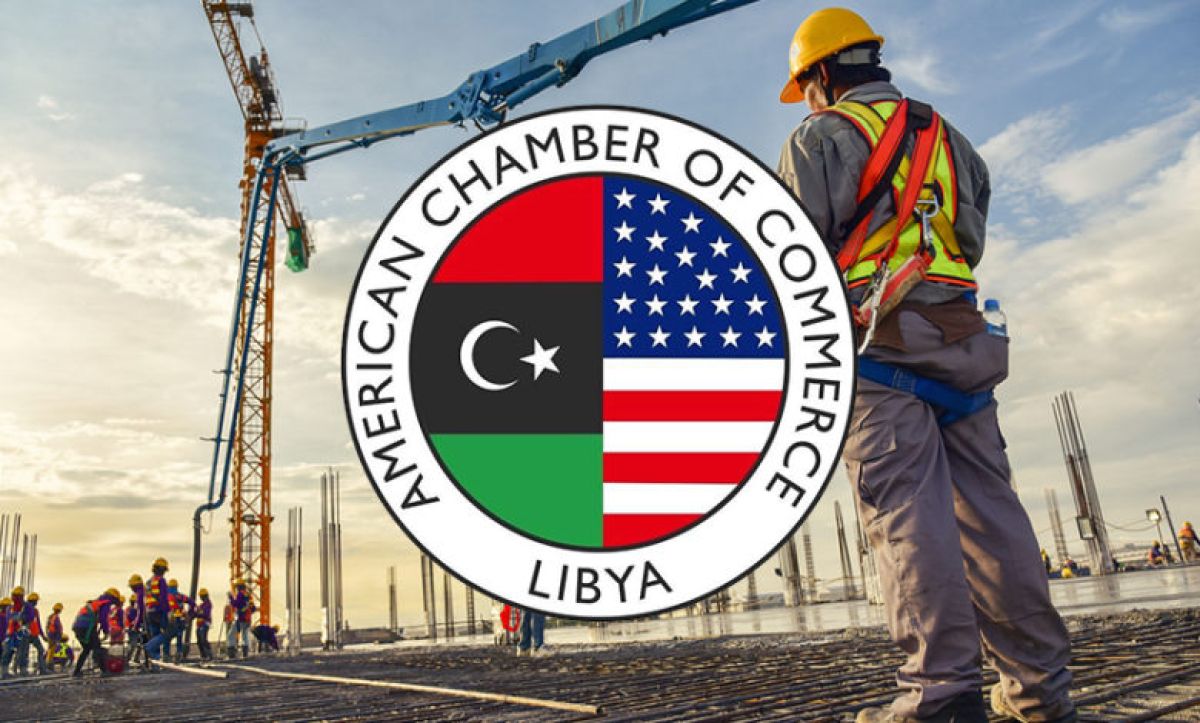AmCham Libya hosts first U.S. trade mission in Tripoli in ten years
The American Chamber of Commerce in Libya (AmCham Libya) hosted the first U.S. business delegation in Libya in ten years. The delegation included representatives of Bechtel, Caterpillar, GE, Hill and Pratt and Whitney.
Making the keynote speech at the event, Economy Minister Mohamed Hwej apologised for arriving late saying it was the traffic and that Libya needed more roads.
Hwej insisted that Libya needed to build a state before it can improve security and then build an economy. He hoped the upcoming elections planned for 24 December 2021 would start this process.
He said Libya’s economy was still extremely centralized and a rentier system which needed to be transformed and diversified.
Libya needed to set a matrix and a masterplan to prioritise and decide which sectors and services to start with.
Transit trade and special zones
He said Libya’s biggest asset is probably its location and that it needs to build a service economy and localise some European sectors. He considered transit trade as an important potential sector where Libya can become a big player. He pointed out that Dubai sold in billions into Africa and said Libya could play this role through a series of large port hubs. There could be two main transit routes through Benghazi, Kufra and on to Port Said, crossing the main Egyptian road. A second could be the Misrata – Tamenhent – Ghat to Niger route.
The Minister said these could be linked to the proposed four new Zuwara, Zawia, Misrata and Sirte ‘‘Special Area’’ free zones. Along these a series of airports need to be developed to create various transport hubs to help transform the country from a rentier oil state to a service economy. The oil sector would continue to develop into a value added up and down stream sector helping to finance part of these plans.
He said Libya can also develop its renewable energy sectors as well as develop its minerals industry. In the south, agriculture has big potential, he added. He hoped these different sectors will create internal competition in the various counties and regions.
Need foreign help
But Minister Hwej said Libya would need foreign help to develop all these sectors and industries in partnerships with developed states. He said Libya does not want to be an isolated island but rather wants to plug into the rest of the world.
He forecast that in as little as 7 years Libya could increase its GDP with a 20 percent growth rate from the current 20 bn to 200 to 250 billion with the help of about 7 million foreign workers.
He said it needs the will, vision and management – which it is missing currently to transform itself to a digital and knowledge economy.
On legacy contracts, Hwej said he expects Libya to keep all its signed contracts especially on strategic projects such as roads and railways, but that these may continue on a PPP basis.

The American Chamber of Commerce in Libya (AmCham Libya) hosted the first U.S. business delegation in Libya in ten years. The delegation included representatives of Bechtel, Caterpillar, GE, Hill and Pratt and Whitney.
Making the keynote speech at the event, Economy Minister Mohamed Hwej apologised for arriving late saying it was the traffic and that Libya needed more roads.
Hwej insisted that Libya needed to build a state before it can improve security and then build an economy. He hoped the upcoming elections planned for 24 December 2021 would start this process.
He said Libya’s economy was still extremely centralized and a rentier system which needed to be transformed and diversified.
Libya needed to set a matrix and a masterplan to prioritise and decide which sectors and services to start with.
Transit trade and special zones
He said Libya’s biggest asset is probably its location and that it needs to build a service economy and localise some European sectors. He considered transit trade as an important potential sector where Libya can become a big player. He pointed out that Dubai sold in billions into Africa and said Libya could play this role through a series of large port hubs. There could be two main transit routes through Benghazi, Kufra and on to Port Said, crossing the main Egyptian road. A second could be the Misrata – Tamenhent – Ghat to Niger route.
The Minister said these could be linked to the proposed four new Zuwara, Zawia, Misrata and Sirte ‘‘Special Area’’ free zones. Along these a series of airports need to be developed to create various transport hubs to help transform the country from a rentier oil state to a service economy. The oil sector would continue to develop into a value added up and down stream sector helping to finance part of these plans.
He said Libya can also develop its renewable energy sectors as well as develop its minerals industry. In the south, agriculture has big potential, he added. He hoped these different sectors will create internal competition in the various counties and regions.
Need foreign help
But Minister Hwej said Libya would need foreign help to develop all these sectors and industries in partnerships with developed states. He said Libya does not want to be an isolated island but rather wants to plug into the rest of the world.
He forecast that in as little as 7 years Libya could increase its GDP with a 20 percent growth rate from the current 20 bn to 200 to 250 billion with the help of about 7 million foreign workers.
He said it needs the will, vision and management – which it is missing currently to transform itself to a digital and knowledge economy.
On legacy contracts, Hwej said he expects Libya to keep all its signed contracts especially on strategic projects such as roads and railways, but that these may continue on a PPP basis.
Latest Posts



